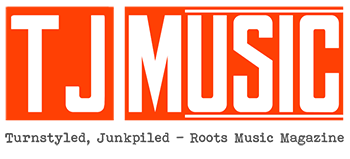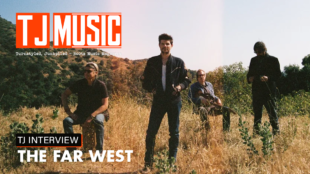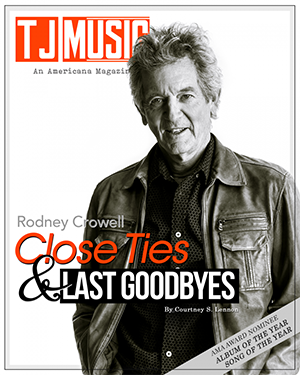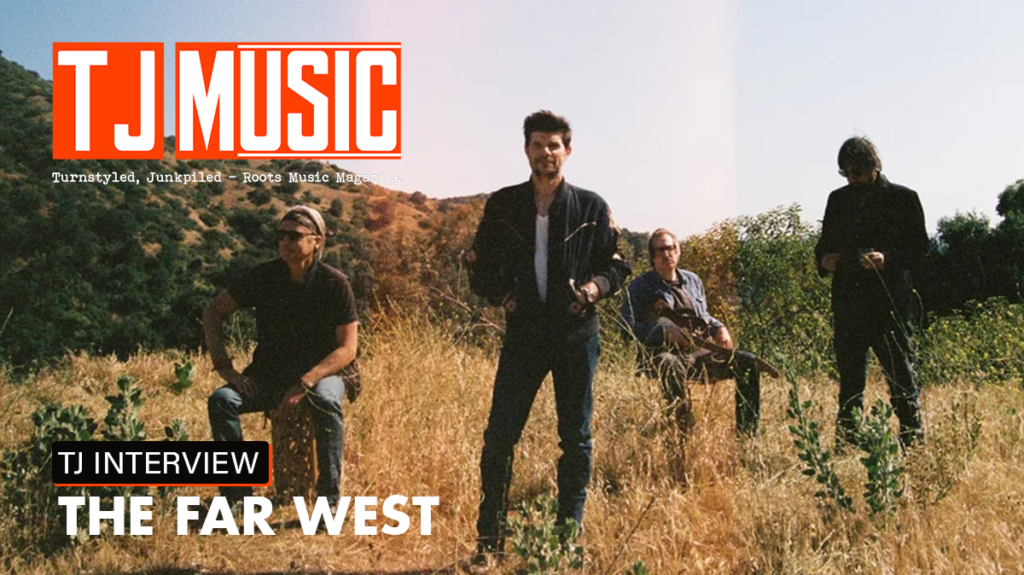
By Brian Rock
The Far West are creating a lot of buzz in country music circles with the release of their latest album, Everything We Thought We Wanted. With a rising tide of positive press and raving reviews, the band seems poised to take their career to the next level. We recently caught up with the band after their showcase performance at AmericanaFest in Nashville. Songwriters Lee Briante (on lead vocals and rhythm guitar) and Robert Black (bass and backing vocals) shared their insights on the new album and the creative process.
First things first, The Far West, where does the name come from?
Robert: That’s a great question. We had a friend who worked at Rhino Records when we couldn’t decide on a name, so he came up with a list of names for us. And that was the only one we all agreed on–The Far West. That was the one we liked.
Brian: Democracy in action.
Lee: Absolutely.
I understand there was a bit of drama getting this album out. Can you tell us about some of the bumps on the road on the way to “Everything We Thought We Wanted?”
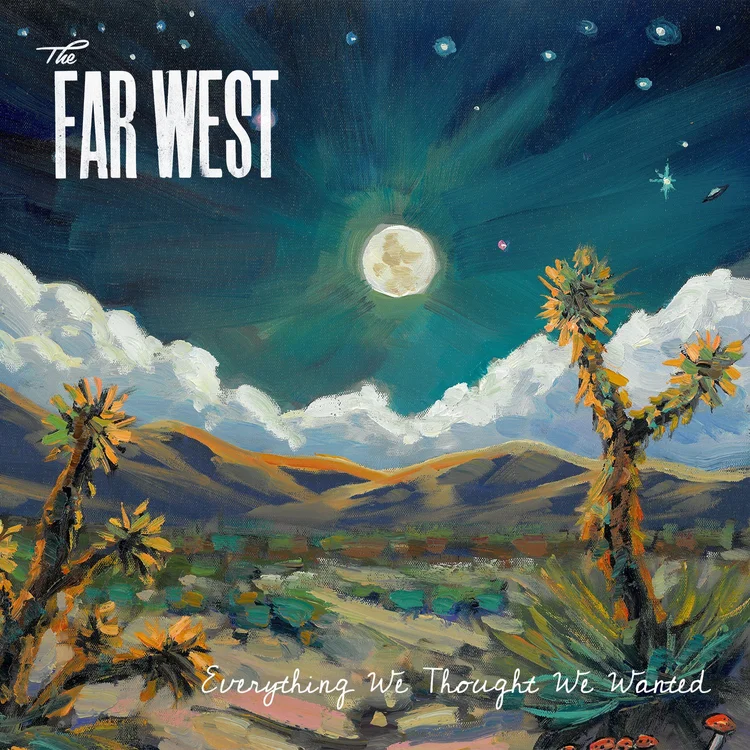
Lee: Well, we were on the road with Dave and Phil Alvin in 2015, and everything was cranking and going well. Then the first thing that kind of put us on a little hiatus was my wife and I had a kid. So, I took a little time off to be there for that. And then COVID came around, and put a stop to what we were working on. We had started recording some tracks for this record back then. Once COVID kind of cooled down, we decided to get back to work, but we could not find the hard drive that we had started all the tracks on. It took about six or eight months to find the hard drive.
So where was it when you found it? Was it like hiding under the couch?
Lee: Well, we had recorded at the School of Audio Engineering in Hollywood where our keyboardist at the time, Mike Whiteside was an instructor. And we would sneak in because we couldn’t afford studio time. We’d sneak in at midnight, we’d stay till three or four in the morning doing our recording. So, we didn’t know if the hard drive was at the school. But the school had closed and moved to a different location. We thought our hard drive could have been lost in the move or packed with the school somewhere. It turned out Mike had it at some friend-of-a-friend’s house. He finally found it and he was like, “Yeah, it’ll be on the porch.” So, I went there one day to get it, and this hard drive was like a giant old suitcase. It looked like it was 100 years old. It was this weird, big thing, and it was just sitting there unattended on the porch. We brought it to our guitarist, Aaron Bakker’s studio. We couldn’t get it booted up for a long time because it’s the type of hard drive that needs to be plugged in and it was barely cranking along. You could hear the thing trying to spool up. Eventually it got going and Aaron and I got what was on that hard drive onto his hard drive just to make sure it was off that old thing…This is the long version.
Brian: As long as it’s the actual version, it’s alright.
Lee: And then we started working on it again. The hard drive was at Aaron’s. He lived in Altadena. The fires came and took his house and the studio where the hard drive was. He just happened to be coming home when he saw the smoke and fire come over the hill. He grabbed the hard drive and a few guitars, and he peeled out of there. So, those are some of the things that delayed this record, and once that fire came along, we knew we had to get this thing finished and done and into the atmosphere so that it was out of our hands, because we were not good stewards of the material.
Robert: Clearly, the material was not safe with us. But we can’t be stopped!
Lee: So now it’s out, thank God, and it’s out of our hands.
Brian: So, either somebody was toying with you from up above or they were helping you every step of the way.
Robert: It was the trials of Job.
So, after all that, who was your producer for this album?
Robert: We were self-produced. We’re calling it produced by the Far West.
Lee: And then we gave it to Dave Trumfio to master. Trunfio is an old Chicago buddy of Aaron’s, who has mixed and mastered for Wilco and a lot of great acts.
Brain: Wilco, that’s some serious Americana cred right there.
Robert: Yeah, we were glad to get him.
The new album feels like a bit of a departure from your first two releases. It seems to have more texture with horns, accordions, and a bit of a lusher sound. What prompted the new direction? Or did new instruments mysteriously appear every time you recovered the lost hard drive?
Robert: We were sneaking into the studio where Mike worked after hours, and there was a great old mixing board that was rumored to have been used by Fleetwood Mac. It gave a warm ’70s sound, and I think that immediately started to inform the record.
Let’s talk about your songwriting, because you guys strike me as the perfect blend of Bakersfield and Greenwich Village. But I also pick up hints of Memphis, Athens GA, Austin, even some Mersey Beat. How do you guys manage to keep your sound so fresh from song to song?
Lee: We don’t think about it. We just let what comes out come out.
Brian: You guys are the songwriters of the band, but you don’t collaborate together. Can you tell me a little bit about how that dynamic works?
Lee: Yeah, I think what has worked since the beginning is that we’ll bring each other these demos that we create at home alone; which is how I’m more comfortable working. I think Robert is too. Maybe it’s shyness, I’m not sure. But once we bring these rough demos to the group, they start to take shape a little more. Sometimes they’re fully developed and Robert knows exactly how it’s supposed to go. Sometimes it’s just a sketch, and when we all get together and start playing through them, they take shape better. But writing apart has worked for us. Occasionally, I’ll fill in a line for him, or he’ll fill a line for me where we need a little help. But as far as getting in a room together and being like, let’s write a song about a breakup – it doesn’t work that way for us.
Brian: And I think because of that, you have a little more intimacy to your songs. Because it’s not a team effort, you don’t have to put on a mask and say, “Oh, I don’t want my co-writer to see me as this weirdo.” You can be the weirdo when you’re writing by yourself.
Robert: Yeah, we are weirdos.
Brian: The best artists are.
Okay, I’m a sucker for a great lyric. One of my favorites from this album is from “See for Yourself,” where you sing, “You never miss your water, till your well runs dry; but you’ve been walking in the desert 40 days and 40 nights. You had to see for yourself – just like everybody else.” To me, that resonates like Dylan’s “Positively Fourth Street.”
What’s one of your favorite lyrics on this album?
Lee: For me, the one that I wrote that I like, is a very simple little couplet, which is, “I knew a man who was born ugly, but he grew more handsome with every good deed,” from “In Your Own Time.” It’s a very simple little thing, but I just like the visual of it.
Robert: Yeah, I like. It reminds me of Pete Seeger.
Brian: Yeah. he got more handsome as he got nicer, too.
Robert: He did, too.
Lee: I also like the line that became the album title. “Everything we thought we wanted turned to dust,” from “For The Birds.”
Brian: And you have a guest vocalist on that one, right?
Lee: Yeah, Katie Stratton, who’s an old L.A. friend of ours. She just has a new record coming out with her band, The What Four, if I could plug her record – which has a bunch of great musicians in it.
Brian: I also like lyrics that have a positive message and on “Better Days,” you guys sing, “We’ll look back on the hard times, say, maybe those are the best days ever.” It’s really a wakeup call to quit whining and enjoy this moment before it’s gone. But the song doesn’t start there. It builds to that moment from a less optimistic starting point.
Did you have the end of mind when you started writing, or did you set out to write a blues song and then just have a change of heart midway through?
Robert: I wrote that one. It did start out as kind of a longing for better days, but as I wrote it, I realized, we live in better days already. So that’s kind of the twist of the song; to say every time I look back on what I thought were hard times, I’m like, you know, back when I was a starving film student in Richmond. I think those were good times. They were fucking awesome times. Why didn’t I stop and enjoy the ride? So that’s really the heart of the song.
Brian: And it’s funny how some of our most painful “in the moment” memories become fond memories over time. You give a clue to that in the song when you say, “My grandfather always talks about the good times between the wars.” And I’m like, that’s the Great Depression you’re talking about.
Robert: It’s a little Easter egg. If you know, you know. The days between the wars is the Great Depression. But Billy Bragg had a song called “Between the Wars,” which is about the same thing, so I kind of swiped it from Billy Bragg.
You guys clearly have a lot of musical influences, but who’s your North Star when you’re stuck or you’re looking for inspiration? Is there one artist you guys turn to as sort of your guiding light?
Lee: No. I mean I’m a big Dylan fan, but I don’t know that I’d call him a “North Star.”
Robert: Dylan’s in my blood. Just like the Beatles. Just like Buck Owens.
Brian: So you’re saying you internalize it so much that it’s already there.
Lee: I don’t want to go outside for what I’m trying to say about inside. You know what I’m saying? I don’t want someone else’s viewpoint. I need my viewpoint.
Has there been a moment when you’re listening to a song and you go, “Hey, if I tweak it just a little, I can make it my own.”
Lee: Yeah, I’ve stolen lines like, to start the song, “Bound to Lose,” I sing, “Sitting on my watch trying to be on time…” which is a lift from a Dylan song off “Love & Theft.” Because “Love & Theft” is all about him stealing all this shit from everybody else. So I thought it only proper that someone returned the favor.
Brian: There you go. A bit of instant karma for Mr. Dylan.
Lee: Oh, and “You never miss your water till your well runs dry…” is from a song on “Sweetheart of the Rodeo” by The Byrds.
Brian: Also, Otis Redding.
Lee: Yeah, and I was listening to that, and sometimes one line can help me go off. And now I’m discovering oh, if I should just get rid of that line and keep the stuff that’s mine. I don’t need to keep the line that’s not mine. Sometimes one line may not be the theme of somebody else’s song, but it gets my track going off somewhere else.
Brian: It’s your catalyst.
Lee: Yeah.
I understand one of your songs is going to be featured in an upcoming film. How’d that come about? What’s the film? Which song?
Lee: Two songs, actually. So, my friends, Bill and Rachel are screenwriters and directors who are from New York. I’m from New York, so we hit it off. I met them on a job where we were all production assistants; and now they’re directors working for Disney and Hulu and stuff. So Rachel has a movie coming out this week called SWIPED, which is about the creator of Bumble. She had worked at Tinder, and she kind of got pushed out by the “bro” mentality there. And she started Bumble, and she started in Texas. In the movie, there’s a scene in a Texas Honky Tonk, where they needed a band in the bar.
Brian: That’s you!
Robert: That’s so us!
Lee: So she called us and asked, “You want to come do this?” So we said, “Hell, yeah!”
Brian: So which song is it?
Lee: They used “Bitter Drunk and Cold.”
Brian: Oh, I love that one. That’s from your first album, right?
Lee: Yeah. They also used “Nothing Like You.” And the movie’s on Hulu this month. We’re in the background of a pretty important scene where they come up with the name of Bumble, I think it was. And yeah, that was a fun 12 hour day that we got paid to do. So, that was great!.
So what’s next for The Far West? Are you guys touring, are you doing any late-night shows, Dancing with the Stars? What do you guys have coming up?
Lee: We’ve got to get home, so we’ve got a bunch of gigs to get us back to L.A. and then we immediately go to work to make sure that this record gets the proper exposure that it deserves after being through so many trials. We want to make sure it gets out.
Robert: Everyone in America needs to hear it!
Brian: I totally agree. “Everything We Thought We Wanted,” is exactly what we’ve wanted all along! Thanks for talking with me today, safe travels back to L.A., and best of luck with the album!
thefarwestofficial.com | fb | buy
Brian Rock
Latest posts by Brian Rock (see all)
- 2025 TJ Stocking Stuffers with Melissa Carper, Jason Heath and the Greedy Souls, Drew Pulliam, and Brother and The Hayes - December 8, 2025
- Sparkle Carcass Maraschino Chevy - November 17, 2025
- Leon Majcen Making A Livin’ (Not A Killin’) - October 27, 2025
